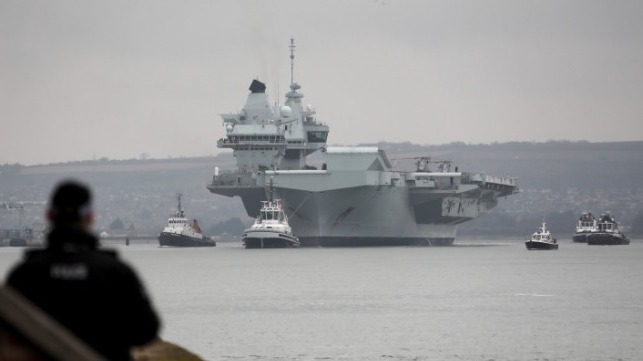The UK's Next Maritime Security Strategy Offers New Opportunities

In March, the UK government published an integrated review that pledged to shift focus on foreign policy, defense, security and international development. Part of this review includes a systematic ‘refresh’ of the UK’s 2014 National Strategy for Maritime Security.
In rolling out the review, Prime Minister Boris Johnson said that it would be the biggest program of investment in defense since the end of the Cold War. An appropriate maritime security strategy will be a key component. In a new paper published in the RUSI Journal, three eminent scholars of maritime security - Christian Bueger, Timothy Edmunds and Scott Edwards - weigh in on the UK’s maritime security strategy refresh, the key priority areas and the challenges policymakers might encounter in translating the strategy into action.
The UK’s National Strategy for Maritime Security in 2014 broke new ground by including non-traditional security issues, including blue crimes (like piracy, smuggling and IUU fishing), the protection of critical infrastructure (ports, ships and maritime trade routes), marine environmental health and sustainability.
It also inaugurated a new whole-of-government approach. The strategy featured a joint forward by ministers from the then-Foreign and Commonwealth Office, Home Office, Ministry of Defense and the Department of Transport (DfT). In addition, twenty-two different UK government and Devolved Administration departments and agencies were identified as having responsibilities in the implementation of the document.
Brexit helped to trigger this strategy refresh. According to the paper, several problems arose post-Brexit in relation to UK’s maritime security. The first was the need to consolidate independent regulations and capacities for domestic maritime security governance. The second was the UK’s need to recalibrate relations with old European partners and foster new global multilateral partnerships in maritime security. Some of these already exist, like the UK’s bilateral relationship with France and its membership in NATO.
The refresh process is being led by DfT and is due to be completed by the end of 2021. Thus, it provides an opportunity for the “UK to re-evaluate its current maritime security problems, assign respective roles for different agencies in addressing it, as well as response mechanisms and resources to do so,” noted the research paper.
However, the challenge will be to channel these inputs into a coherent and actionable strategy. Since the Integrated Review was launched, there has been a proliferation of strategies within the UK government with relevance to maritime security. Some of the most important include the Integrated Review of Security, Defense, Development and Foreign Policy, as well as DfT’s Maritime 2050 Strategy.
The paper therefore ponders how the 2021 National Strategy for Maritime Security can avoid being ‘lost’ in the crowd of similar and related documents. Essentially, this forms the crux of the refresh process as the first challenge lies in drafting the document. To ensure ownership of the strategy across departments, there is importance of multi-agency and cross-government engagement in the drafting process.
Meanwhile, “the UK maritime security strategy needs to pay close attention to how maritime insecurities have evolved since 2014,” adds the paper.
First, the evolution of grey-zone warfare at sea - like new provocations and challenges to freedom of navigation by Russia or China - and the threats posed by states and state-sponsored violent actors, as in the case of Strait of Homuz.
Second, there is an emerging trend in the link between blue crime and terrorism, as evidenced by the threat to shipping by militants in Mozambique and Yemen.

that matters most
Get the latest maritime news delivered to your inbox daily.
Environmental challenges such as climate change and biodiversity loss adds to another new pattern of maritime insecurity, which this strategy refresh should emphasize. “Climate change will lead to sea-level rise, with challenges that the National Strategy for Maritime Security needs to prepare for today,” the authors warned.
Their last major area of emphasis is on the UK’s preparedness and response to disruption of the undersea cable network. The UK is a key node in the global network of digital communication, as it is the main landing point for transatlantic cables connecting Europe with North America.
